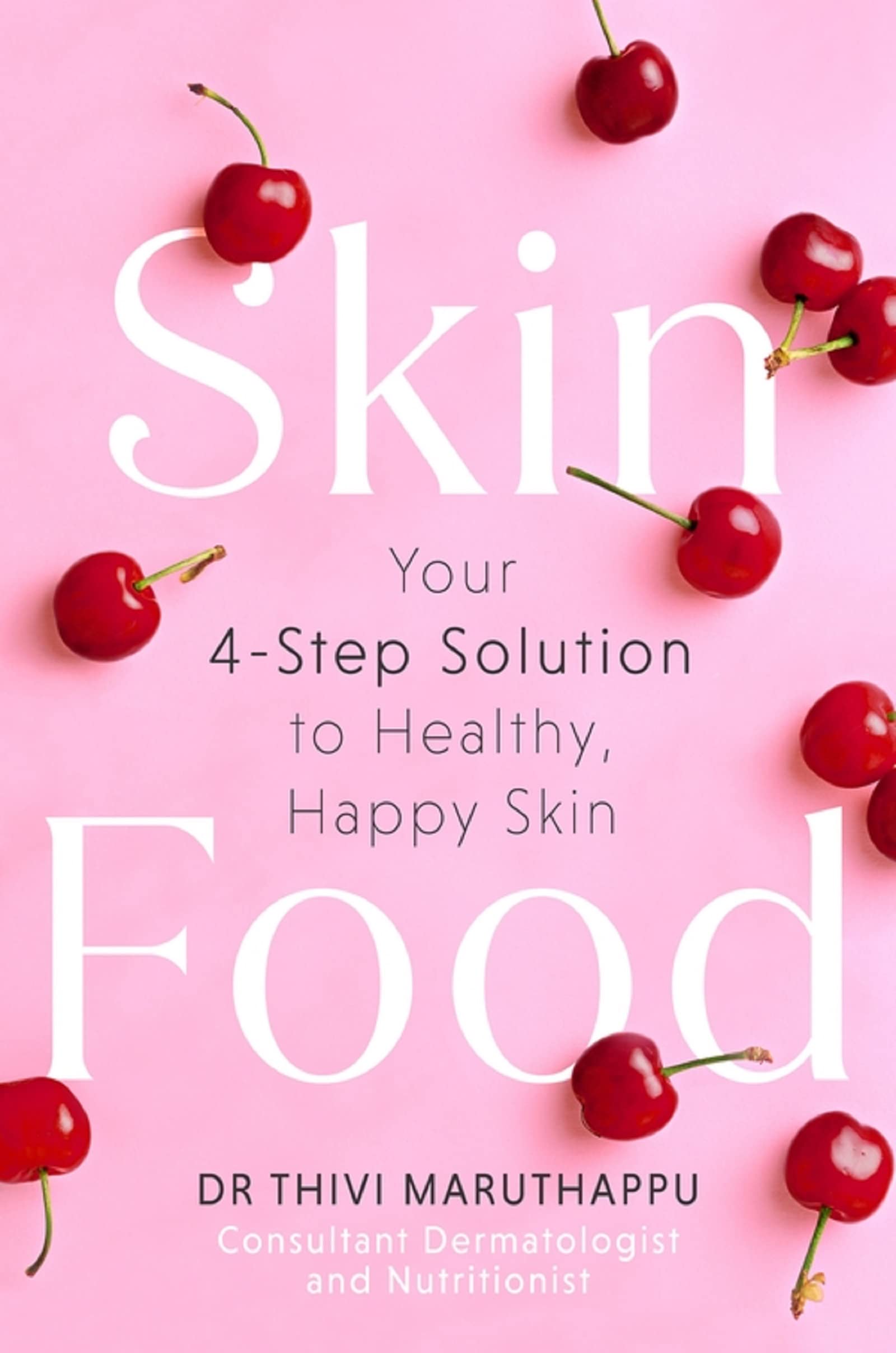
- The UK’s First Dual-Qualified Consultant Dermatologist and Nutritionist
- Honorary Senior Lecturer, Department of Nutritional Sciences, King’s College London
Does what you eat affect your skin? This is a question that we have all been asked time and time again and yet there is so little available to help us answer it. My motivation for writing “SkinFood,” the first book of its kind, was to make evidence-based nutritional advice for skin health accessible for all, whether you are simply looking to improve the health of your skin to or address a specific skin concern such as acne, rosacea, eczema or psoriasis. In SkinFood, you will learn about my holistic approach to skin health and the revolutionary 4 Step Skin Solution:
Step 1: Nutrition for skin health, incorporating the Gut-Skin Axis
Step 2: The Mind-Skin connection and the role of stress and sleep on the skin
Step 3: How to put an effective skincare routine together, tailored for individual skin concerns
Step 4: Medical or in-clinic treatment options for those who wish to pursue them
It is your comprehensive roadmap to skin health whatever your skin concern. Specific dietary advice in SkinFood has been reviewed by a team of dietitians to ensure that it is in line with best practice, so you can feel confident in using it to answer your patients and clients queries.
Background
The relationship between nutrition and skin health is a topic that has been overlooked for many years and yet it is a subject that patients, clients and members of the public ask about frequently. In fact, our research shows that over 90% of dermatologists and dermatology nurses are asked about the role of diets in clinic, and yet very few feel confident in answering those questions. This research will be presented at the British Association of Dermatology Annual Meeting next week.
There are a myriad of supplements targeted to turn back the clock, fight acne, clear eczema and many other skin concerns but what’s the science behind all of these and are they worth it? Nutritional Dermatology is an emerging field that bridges the gap between our understanding of Nutrition and Skin Health, bringing evidence and research to a previously under-recognised area that is central to Nutrition Science.
The Skin Hair and Nails as markers of nutritional status
Did you know that your skin hair and nails are some of the first places that we see signs of nutritional deficiencies. Iron deficiency for example leads to dry, itchy skin, brittle nail and hair shedding. A diet lacking in Omega 3 fatty acids can result in flaky skin that is unable to retain moisture. Low vitamin C levels leads to classical skin appearances due to improper formation of collagen, with small haemorrhages visible around hair follicles, bleeding gums and curled hairs. High cholesterol levels can manifest themselves in the skin as yellowish plaques around the eyes (xanthelasma). Low carbohydrate diets such as “keto diets” can cause a peculiar rash called “Keto-rash” that miraculously resolves when the sufferer starts to eat carbohydrates again. There are many more ways that the skin can be influenced by our nutritional status, but this is just the start.
These links between skin health and nutritional status are clear, but how can we use this understanding in clinical practice? In fact, skin, hair and nail signs of nutrient status are important markers that are highly relevant to many medical conditions including restrictive eating disorders and digestive disorders that result in malabsorption.

Nutrition and Common Skin Conditions
There is a growing body of research to support the role of nutrition as an adjunct to the management of many common skin concerns. Skin concerns frequently carry a significant psychological burden, given their visible nature. As such, the role of nutrition is one that must be approached with care and sensitivity.
Acne vulgaris is one of the commonest skin concerns and the role of diet in acne has remained controversial amongst dermatologists for many years. Yet one study suggests that over 90% of people with acne believe that their diet plays a role. Current evidence, largely from population-based studies suggests that high glycaemic index diets and dairy milk may play a role. However, these potential triggers are not universally relevant, with hormonal and genetic factors being the primary driving force behind pesky breakouts.
Vitamin supplements are widely touted as the solution to skin concerns but Biotin supplements, high dose B12 and whey protein powder can all contribute to acne flares. By contrast, for those with underlying polycystic ovarian syndrome, a lower glycaemic diet and myo-inositol supplements may be helpful.
Psoriasis is a common inflammatory skin concern that affects up to 4% of the population. Sufferers experience painful, itchy scaly patches over their skin. Our research study at King’s is the first of it’s kind to bring together a team of nutritionists and dietitans (Dr Wendy Hall, Dr Rachel Gibson, Sylvia Zanesco) and dermatologists (Professor CEM Griffiths and myself) to examine the role of nutrition and psoriasis. Psoriasis is not simply a skin condition, it is closely linked to cardiovascular co-morbities such as hypertension, ischaemic heart disease and fatty liver disease.
Current evidence suggests that weight is clinically relevant to psoriasis severity and that weight management is helpful in mitigating disease severity and associated co-morbidities such as those mentioned earlier. A gluten-free diet may be relevant to a subset of patients with psoriasis who have positive coeliac antibodies on serology.
Rosacea is a common inflammatory skin concern resulting in redness of the central area of the face, flushing and pimple-like skin lesions. In recent years, our understanding of the dietary triggers for rosacea has increased, and reducing exposure to these is an important part of management. Triggers are individual but can include alcohol, hot drinks, spicy foods and foods that are higher in histamine such as fermented foods and aged cheese. There is also a fascinating connection between rosacea and gut, and it has been found to be linked to H Pylori, Small Intestinal bacterial Overgrowth, Irritable bowel syndrome, Inflammatory bowel disease and coeliac disease. It is therefore important to screen patients with roscacea appropriately for gut symptoms.
Eczema is a common skin concern and yet the role of diet in adult eczema is one that remains to be fully understood. Unlike the role of food allergies in childhood eczema, there is much less research on diet in adult eczema, and data from children cannot be extrapolated. Generally, the role of food allergens appears to play less of a role in adults but formal allergy testing is advised for immediate reactions. For delayed reactions, the supervision of a specialist dietitian is recommended in keeping a food diary and omitting suspect foods with care. Restrictive eating disorders may arise in those attempting to identify dietary triggers without the supervision of a nutrition professional and this is strongly advised against.
Nutrition is also integral to health skin ageing, dietary phytonutrients are powerful anti-oxidants that mitigate the effect of free radical damage to collagen in the dermal layer of the skin. In addition, adequate protein intake is required to sustain collagen formation as well as keratin for nails and hair as both are primarily constructed from amino acids.
The Gut-Skin Axis
The role of the gut microbiome in skin health, and its interaction with the skin microbiome is a fascinating area of current research. As yet we do not have clear cut probiotic recommendations for specific skin concerns but there is growing evidence that dysbiosis (an “imbalance” in the gut microbial community that is associated with disease) can be linked to rosacea, acne, psoriasis and eczema and can also play a role in healthy skin ageing. Small studies in individuals with psoriasis and acne have noted improvements in skin severity with probiotic supplements for a period of 10-12 weeks, however these studies are limited by the fact that they are small, with a large placebo effect and each study used a different strain of probiotic. Therefore, specific recommendations cannot be made and instead, it is recommended that patients/clients are advised to support the gut microbiome through established dietary measures.
Supplements for skin health – worth the hype?
There are a myriad of supplements promoted for skin, hair and nail health and yet very few of these have any evidence to back up their claims. My recommendation is to try to obtain nutrients from diet where possible, supplementing if necessary or if there is a measurable deficiency. For example, those following a vegan or vegetarian diet should supplement with B12 and plant-based (algal) omega 3. Low vitamin D levels have been linked to worsened severity of many skin concerns and should be supplemented at least during the winter months.
Summary
The role of nutrition in skin health is an exciting new field of study known at Nutritional Dermatology and encompasses the role of diet, the gut microbiome and supplements on skin health. In SkinFood, you will find thorough, detailed evidence-backed guidance to help improve the health of your clients/patients skin as well as tips for optimise your own skin health too!
If you have benefited from MyNutriWeb blogs, please consider supporting us by making a voluntary donation to help with funding our mission empowering professionals working in nutrition.







Can a Webinar be done about
“Does what we eat affects your skin”?
Yes we have a webinar coming up next month, you can register here: https://mynutriweb.com/nutrition-for-skin-health-practical-tips-for-tricky-questions/
This is an useful and myth bursting article. I did not know that some common supplements like biotin, Vitamin B12 and whey protein can flare up acne. Thank you. I had registered for the webinar as well but cannot attend live due to time difference. Looking forward to the recorded version.
This is super interesting! Can you recommend a book that covers skin as well as nails and hair?
Hi there. Thivi says unfortunately there isn’t one on nutrition for hair and nails yet – there are dermatology textbooks but these don’t focus on nutrition